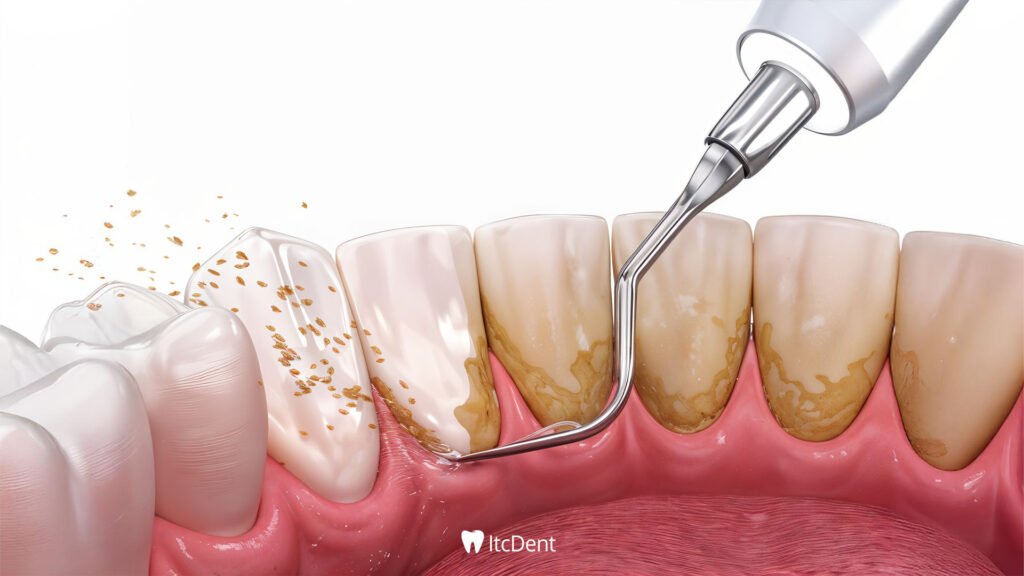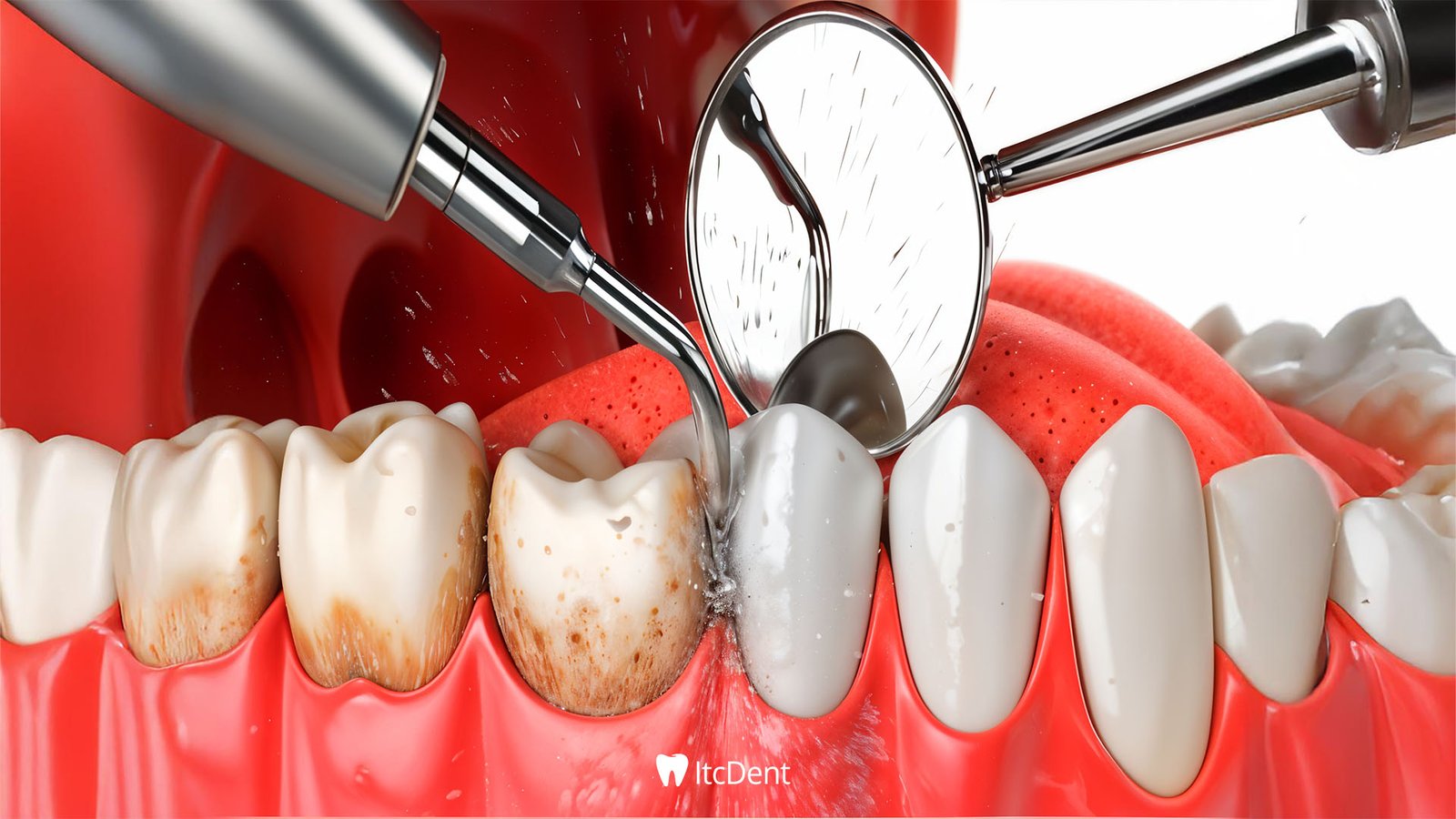Dental Scaling
Dental scaling is an extremely important process to maintain oral health and keep your teeth healthy. Dental tartar is formed by the hardening of plaque that accumulates over time in areas that are not cleaned when you brush your teeth. These hardened plaques turn into deposits on the teeth known as tartar. Tooth stones may not be noticed at first, but when they continue to accumulate for a long time, they can lead to serious health problems such as yellowing of teeth, bad breath, gingivitis and tooth loss.
Tartar usually settles in areas that are overlooked during the tooth brushing process. Therefore, scaling is not only an aesthetic necessity but also plays an important role in maintaining oral health. Over time, tartar deposits can damage the gums, causing gingivitis, bleeding and infections. If these deposits are not cleaned regularly, larger and permanent dental problems may occur.
What is Dental Stone?
Dental tartar is deposits formed by the hardening of plaque on the teeth over time. Plaque forms a thin layer on the surface of the teeth with the combination of substances such as bacteria, food residues, sugar and saliva in the mouth. If this plaque is not removed by brushing the teeth regularly, it mineralizes and hardens over time. This hardened plaque is known as calculus. The formation of tartar becomes inevitable, especially when oral hygiene is not taken into consideration.
Tartar is generally more common in areas close to the gums, especially at the back of the teeth and at the bottom of the teeth. Because these are the areas where the toothbrush has difficulty reaching effectively. Therefore, tartar accumulates more easily at these points. Tartar may initially be yellow or white in color, but over time it becomes darker and may take on brownish tones. This color change occurs due to the effects of substances such as bacteria and tobacco on the dental stones.
Dental tartar not only creates an aesthetic problem, but can also negatively affect oral health. Tartar can put pressure on the gums and cause inflammation. This can lead to gum disease, bleeding gums and more serious dental problems. Accumulation of tartar can put pressure on the teeth, damage the tooth enamel and pave the way for the formation of cavities. At the same time, tartar can cause bad breath because the buildup of bacteria on these hardened plaques can cause bad breath.

Why is Dental Stone Cleaning Important?
There are several reasons why dental scaling is important. First, tartar deposits can cause an aesthetically unpleasant appearance. Yellowing of your teeth indicates the presence of tartar deposits, which can negatively affect a person’s self-confidence. However, the only negative effect of dental stones is not aesthetics, they also threaten oral health. Tartar deposits can lead to gingivitis and periodontal disease. Gingivitis can cause gums to swell, bleed, and cause pain. Dental scaling protects oral health by preventing such problems.
Dental tartar paves the way for the accumulation of bacteria. Bacteria can multiply rapidly on the surface of dental tartar, which can lead to tooth decay. With dental scaling, these bacteria are eliminated, thus preventing tooth decay and gum diseases. Additionally, tartar deposits can damage the surface of the teeth and erode tooth enamel. This may cause tooth sensitivity and caries formation.
How is Dental Stone Cleaning Done?
After examining your teeth and gums, the dentist chooses an appropriate method to remove tartar deposits. We follow these steps in dental stone cleaning:
- Oral Examination and X-ray: The dentist examines your teeth and gums and detects tartar deposits. He or she may also take x-rays to evaluate the condition of your teeth and gums.
- Scaling: For scaling, the dentist usually uses ultrasonic tools or manual tools. Ultrasonic devices loosen tartar deposits with vibrations and wash them with water. Dental tartar is cleaned by carefully scraping with hand tools.
- Polishing of Teeth: After scaling, your teeth are polished to obtain a smooth surface. This helps keep your teeth cleaner and prevents plaque deposits from forming again.
- Fluoride Application: After scaling, the dentist usually applies a gel containing fluoride. This gel strengthens your teeth and helps prevent the formation of cavities.
It is usually painless, but some patients may experience a slight discomfort during the procedure. After scaling, your teeth may be sensitive, but this usually passes in a short time.
Who Should Have Dental Stone Cleaning?
Scaling is especially important for people who do not brush or floss their teeth regularly. Additionally, smokers and people who frequently consume beverages that stain teeth, such as tea or coffee, are also more prone to tartar deposits. To prevent further formation of tartar deposits, regular scaling is recommended by the dentist.
It is also an important step to prevent gum diseases and tooth decay. Tartar deposits can cause inflammation of the gums, which can lead to more serious dental health problems if left untreated. Therefore, it is recommended that dental scaling be done at least once a year.

Things to Consider After Dental Stone Cleaning
There are some maintenance steps that need to be taken into consideration afterwards. It is important to continue to brush your teeth regularly, use dental floss, and maintain your oral health with mouthwash. Additionally, avoiding sugary foods and acidic drinks will support the health of your teeth. By following the care instructions recommended by the dentist, you can prevent the recurrence of tartar deposits.
Dental Stone Cleaning Price
It may vary depending on various factors. First, the dentist’s experience and the type of clinic he works in may affect this price. Additionally, the extent of scaling will also determine the cost; A simple cleaning along with additional services such as fluoride application or teeth polishing can increase the price. Another factor is the price policies of your region and clinics. Overall, scaling is an important investment in maintaining your oral health and is recommended regularly.


